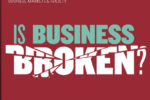
(Outlet: Gothamist) The five-week course called Culinary Career Pathways for New New Yorkers was launched in April by the nonprofit group Hot Bread Kitchen, which trains New Yorkers for jobs in the food industry. Although the course is patterned after the organization’s signature Culinary Fundamentals course, it has an important twist: It was designed specifically for newly arrived Latin American migrants who have secured work permits and set their sights on careers in the food industry. But the benefits and possibilities extend far beyond the individuals in this classroom.…Read More











